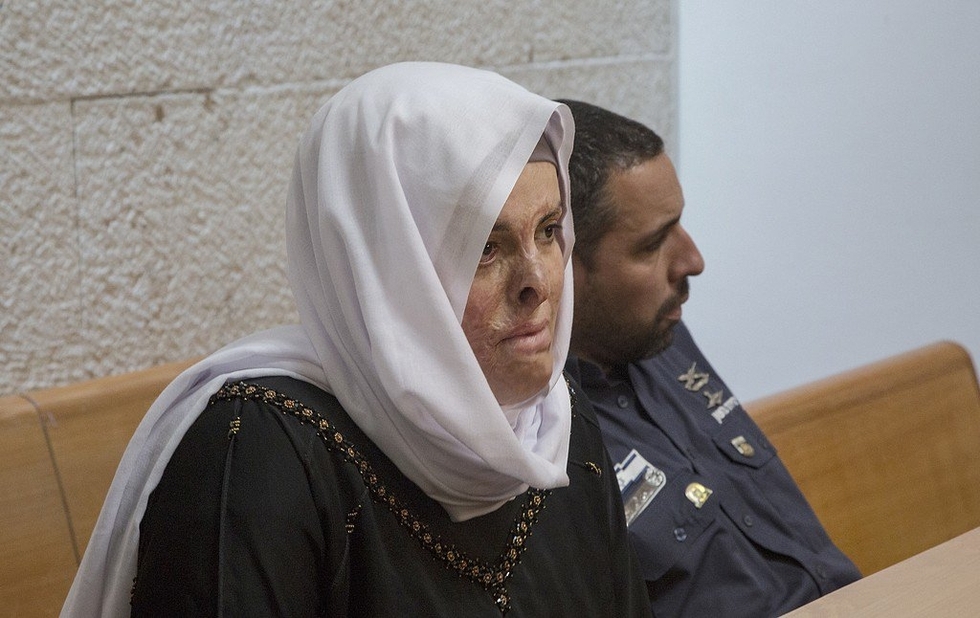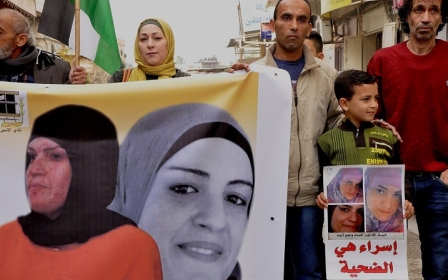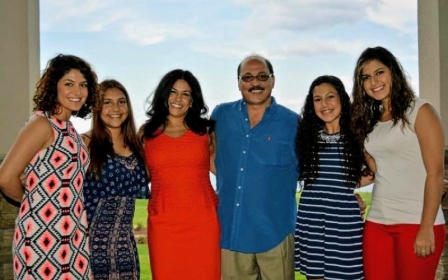Palestinian prisoner who requires urgent medical care loses bid for freedom

A jailed Palestinian woman who requires urgent medical care for severe injuries has lost her appeal in Israel's highest court for her release from prison.
Israa Jaabis, 32, was arrested in October 2015 with burns over half of her body after she and her family say a faulty cylinder of cooking gas burst into flames in front of an East Jerusalem checkpoint.
Israeli authorities charged Jaabis with attempting to detonate a bomb in order to harm Israeli soldiers. She was sentenced to 11 years in prison.
'The judge did not show any compassion or empathy or any mercy. This didn't surprise me'
- Lea Tselmel, Israa Jaabis's lawyer
While imprisoned, Jaabis, her lawyer, Lea Tselmel, and fellow prisoners say she has lived with pain and struggled to receive adequate medical care. She appealed her sentence so she could be released for treatment.
But on Thursday, Israel's high court rejected her appeal, meaning that Jaabis will remain in prison for the remainder of her sentence.
"We had a bit of hope that the system might consider her difficult health situation, but we were wrong," Jaabis's sister Muna told Middle East Eye on Thursday. "Now we will put all of our efforts to get her medical help inside the prison.
"The judge did not show any compassion or empathy or any mercy," said Tselmel. "This didn't surprise me."
Now they plan to push for Jaabis to receive immediate medical treatment for injuries including repeatedly infected ears, a throughly burnt nose that is hard to breathe through, one arm she can no longer raise and spasms in her hands and feet.
"I think there is a possibility to get this," Tselmel said.
'I'm being destroyed every day'
In the weeks leading up to Jaabis's appeal, supporters launched a public campaign on her behalf, holding protests and circulating a letter that Jaabis wrote about her situation in the prison.
"I'm being destroyed every day. I need psychotherapy that helps me face my painful situation. I feel scared when I look at myself in the mirror, so how about the others?" Jaabis wrote.
Mivrat Sadiq, a Palestinian journalist and one of the campaigners supporting Jaabis, said everyone had anticipated that the appeal would be denied.
"But the pressure our campaign has made has opened the possibility for legal pressure to provide Israa with medical aid," Mivrat said.
She said that nine other injured female Palestinian prisoners are also hopeful that, as a result of the attention around Jaabis's case, they may be able to obtain better medical care eventually too.
Aid workers who provide medical services to Palestinian prisoners told Middle East Eye earlier this month that hundreds of inmates call their organisations each year saying they are struggling to get medical care and asking for help.
Amany Dayif, who used to work on behalf of detainees in Israeli prisons to access healthcare, said that no one knows how many Palestinians in Israeli detention need care or what their conditions are because there is a lack of oversight from the Israeli health ministry.
"The Israeli prison service has no standard of medical care. For example, it does not collect statistics regularly regarding the illnesses or the healthcare needs of prisoners, something that is considered a crucial component of proper healthcare systems," Dayif said.
From her experience, she said, Israeli prison authorities manage the prisoner healthcare system poorly "mainly because it is a security organisation that sees healthcare as a last priority issue".
New MEE newsletter: Jerusalem Dispatch
Sign up to get the latest insights and analysis on Israel-Palestine, alongside Turkey Unpacked and other MEE newsletters
Middle East Eye delivers independent and unrivalled coverage and analysis of the Middle East, North Africa and beyond. To learn more about republishing this content and the associated fees, please fill out this form. More about MEE can be found here.




